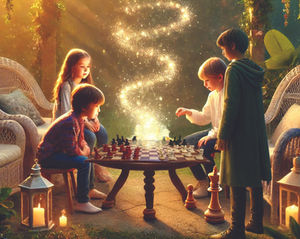Quaternity & The Elephant in the Dark
- Jorge Mas
- Jan 27, 2020
- 2 min read
Updated: Oct 31, 2024

There is a parallelism between Quaternity chess and “The Elephant in the Dark”s fable. It is a parallelism between the “Real” and “what I feel”.
A group of friends decides to explore a space where it is said an “elephant” is being kept. They ignore what an "elephant" is or how it looks like, what the “Real” is.
Similarly, in Quaternity Chess a group of friends get together around a chessboard, perhaps attracted by “what they feel”, be it entertainment or something they’ve heard about it.
In the story -as it is something unknown or “new”- each person touches a different part of the elephant: the trunk, the leg, the back, and each of them tries to explain what they have perceived.
In a game of Quaternity Chess every friend finds different things, and -as in the story- their findings are very much connected with what they already carry as their own baggage.
They will bring these elements to the chessboard in the form of judgements or conditioning that makes them perceive the very same object in different ways, that is from their own ‘point of view’.
One group could decide to circumvallate the "elephant" holding hands, showing how good they feel about it; another may praise what they see as ‘genius’ in the game, a meeting place that also allows us to see our own emotions.
Others will observe how it is possible to go from the particular to the general in each move, towards paying attention to the whole chessboard.
And we can see the existing points of reference; the eleven rules can be applied to the game: we need to be aware of our breathing, observe our own steps, keep in the memory, use restriction and more.
There is a difference between the situation in the story and Quaternity Chess.
In the story you receive information that the ‘real’ exists. In Qchess you are one of the subjects that come into contact with the “elephant” and when you see that it moves around you might feel vertigo and maybe perceive that there are many possibilities that you actually ignore. Like jumping on top of the "elephant", for example, and moving with it.
When you are enjoying a game, where the essential elements are pieced together and each person brings from his/her own ‘baggage’ what is necessary, you may feel vertigo and you might see that you are just at the beginning of the story of the ‘Real’.
You might also remember that from a distant place somebody knows how the “elephant” looks like and it’s capable of seeing it in its totality and knows and offers us the possibility to participate in the story, not just to tell ourselves our own story.
He who tastes, knows.
Jorge Mas
♛♔








Comments